| Listing 1 - 8 of 8 |
Sort by
|
Book
ISBN: 1108846785 1108804780 Year: 2020 Publisher: Cambridge : Cambridge University Press,
Abstract | Keywords | Export | Availability | Bookmark
 Loading...
Loading...Choose an application
- Reference Manager
- EndNote
- RefWorks (Direct export to RefWorks)
Learning to program isn't just learning the details of a programming language: to become a good programmer you have to become expert at debugging, testing, writing clear code and generally unsticking yourself when you get stuck, while to do well in a programming course you have to learn to score highly in coursework and exams. Featuring tips, stories and explanations of key terms, this book teaches these skills explicitly. Examples in Python, Java and Haskell are included, helping you to gain transferable programming skills whichever language you are learning. Intended for students in Higher or Further Education studying early programming courses, it will help you succeed in, and get the most out of, your course, and support you in developing the software engineering habits that lead to good programs.
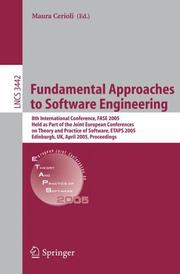
ISSN: 03029743 ISBN: 354025420X 9783540254201 3540319840 Year: 2005 Volume: 3442 Publisher: Berlin New York : Springer,
Abstract | Keywords | Export | Availability | Bookmark
 Loading...
Loading...Choose an application
- Reference Manager
- EndNote
- RefWorks (Direct export to RefWorks)
ETAPS 2005 was the eighth instance of the European Joint Conferences on Theory and Practice of Software. ETAPS is an annual federated conference that was established in 1998 by combining a number of existing and new conf- ences. This year it comprised ?ve conferences (CC, ESOP, FASE, FOSSACS, TACAS), 17 satellite workshops (AVIS, BYTECODE, CEES, CLASE, CMSB, COCV, FAC, FESCA, FINCO, GCW-DSE, GLPL, LDTA, QAPL, SC, SLAP, TGC, UITP), seven invited lectures (not including those that were speci?c to the satellite events), and several tutorials. We received over 550 submissions to the ?ve conferences this year, giving acceptance rates below 30% for each one. Congratulations to all the authors who made it to the ?nal program! I hope that most of the other authors still found a way of participating in this exciting event and I hope you will continue submitting. The events that comprise ETAPS address various aspects of the system - velopment process, including speci?cation, design, implementation, analysis and improvement. The languages, methodologies and tools which support these - tivities are all well within its scope. Di?erent blends of theory and practice are represented, with an inclination towards theory with a practical motivation on the one hand and soundly based practice on the other. Many of the issues involved in software design apply to systems in general, including hardware s- tems,andtheemphasisonsoftwareisnotintendedtobeexclusive.
Software engineering. --- Computer science. --- Compilers (Computer programs). --- Software Engineering. --- Computer Science Logic and Foundations of Programming. --- Compilers and Interpreters. --- Computer software engineering --- Engineering --- Compiling programs (Computer programs) --- Computer programs --- Programming software --- Systems software --- Informatics --- Science --- Software engineering --- Génie logiciel --- Congresses --- Congrès --- EPUB-LIV-FT SPRINGER-B
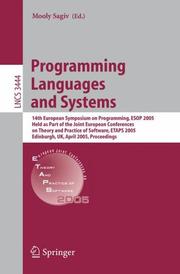
ISSN: 03029743 ISBN: 3540254358 9783540254355 3540319875 Year: 2005 Volume: 3444 Publisher: Berlin New York : Springer,
Abstract | Keywords | Export | Availability | Bookmark
 Loading...
Loading...Choose an application
- Reference Manager
- EndNote
- RefWorks (Direct export to RefWorks)
ETAPS 2005 was the eighth instance of the European Joint Conferences on Theory and Practice of Software. ETAPS is an annual federated conference that was established in 1998 by combining a number of existing and new conf- ences. This year it comprised ?ve conferences (CC, ESOP, FASE, FOSSACS, TACAS), 17 satellite workshops (AVIS, BYTECODE, CEES, CLASE, CMSB, COCV, FAC, FESCA, FINCO, GCW-DSE, GLPL, LDTA, QAPL, SC, SLAP, TGC, UITP), seven invited lectures (not including those that were speci?c to the satellite events), and several tutorials. We received over 550 submissions to the ?ve conferences this year, giving acceptance rates below 30% for each one. Congratulations to all the authors who made it to the ?nal program! I hope that most of the other authors still found a way of participating in this exciting event and I hope you will continue submitting. The events that comprise ETAPS address various aspects of the system - velopment process, including speci?cation, design, implementation, analysis and improvement. The languages, methodologies and tools which support these - tivities are all well within its scope. Di?erent blends of theory and practice are represented, with an inclination towards theory with a practical motivation on the one hand and soundly based practice on the other. Many of the issues involved in software design apply to systems in general, including hardware s- tems,andtheemphasisonsoftwareisnotintendedtobeexclusive.
Software engineering. --- Compilers (Computer programs). --- Computer programming. --- Computer science. --- Machine theory. --- Software Engineering. --- Compilers and Interpreters. --- Programming Techniques. --- Computer Science Logic and Foundations of Programming. --- Formal Languages and Automata Theory. --- Computer programming --- Programming languages (Electronic computers) --- Programmation (Informatique) --- Langages de programmation --- Congresses --- Congrès --- EPUB-LIV-FT SPRINGER-B
Book
ISBN: 366249664X 3662496658 Year: 2016 Publisher: Berlin, Heidelberg : Springer Berlin Heidelberg : Imprint: Springer,
Abstract | Keywords | Export | Availability | Bookmark
 Loading...
Loading...Choose an application
- Reference Manager
- EndNote
- RefWorks (Direct export to RefWorks)
This book constitutes the proceedings of the 19th International Conference on Fundamental Approaches to Software Engineering, FASE 2016, which took place in Eindhoven, The Netherlands, in April 2016, held as Part of the European Joint Conferences on Theory and Practice of Software, ETAPS 2016. The 23 full papers presented in this volume were carefully reviewed and selected from 90 submissions. They were organized in topical sections named: concurrent and distributed systems; model-driven development; analysis and bug triaging; probabilistic and stochastic systems; proof and theorem proving; and verification. .
Computer Science --- Engineering & Applied Sciences --- Computer science. --- Software engineering. --- Programming languages (Electronic computers). --- Computer logic. --- Mathematical logic. --- Computer Science. --- Software Engineering. --- Programming Languages, Compilers, Interpreters. --- Logics and Meanings of Programs. --- Mathematical Logic and Formal Languages. --- Algebra of logic --- Logic, Universal --- Mathematical logic --- Symbolic and mathematical logic --- Symbolic logic --- Mathematics --- Algebra, Abstract --- Metamathematics --- Set theory --- Syllogism --- Computer science logic --- Logic, Symbolic and mathematical --- Computer languages --- Computer program languages --- Computer programming languages --- Machine language --- Electronic data processing --- Languages, Artificial --- Computer software engineering --- Engineering --- Informatics --- Science --- Logic design. --- Design, Logic --- Design of logic systems --- Digital electronics --- Electronic circuit design --- Logic circuits --- Machine theory --- Switching theory --- Software engineering --- Compilers (Computer programs). --- Machine theory. --- Compilers and Interpreters. --- Computer Science Logic and Foundations of Programming. --- Formal Languages and Automata Theory. --- Compiling programs (Computer programs) --- Computer programs --- Programming software --- Systems software --- Abstract automata --- Abstract machines --- Automata --- Mathematical machine theory --- Algorithms --- Recursive functions --- Robotics
Book
ISBN: 3319791087 3319791079 Year: 2018 Publisher: Cham : Springer International Publishing : Imprint: Springer,
Abstract | Keywords | Export | Availability | Bookmark
 Loading...
Loading...Choose an application
- Reference Manager
- EndNote
- RefWorks (Direct export to RefWorks)
Bidirectional transformations (BX) are means of maintaining consistency between multiple information sources: when one source is edited, the others may need updating to restore consistency. BX have applications in databases, user interface design, model-driven development, and many other domains. This volume represents the lecture notes from the Summer School on Bidirectional Transformations, held in Oxford, UK, in July 2016. The school was one of the final activities on the project "A Theory of Least Change for Bidirectional Transformations", running at the University of Oxford and the University of Edinburgh from 2013 to 2017 and funded by the UK Engineering and Physical Sciences Research Council. The five chapters included in this volume are a record of most of the material presented at the summer school. After a comprehensive introduction to bidirectional transformations, they deal with triple graph grammars, modular edit lenses, putback-based bidirectional programming, and engineering of bidirectional transformations.
Computer science. --- Software engineering. --- Computer logic. --- Database management. --- Management information systems. --- Computer Science. --- Software Engineering/Programming and Operating Systems. --- Logics and Meanings of Programs. --- Management of Computing and Information Systems. --- Database Management. --- Computer-based information systems --- EIS (Information systems) --- Executive information systems --- MIS (Information systems) --- Sociotechnical systems --- Information resources management --- Management --- Data base management --- Data services (Database management) --- Database management services --- DBMS (Computer science) --- Generalized data management systems --- Services, Database management --- Systems, Database management --- Systems, Generalized database management --- Electronic data processing --- Computer science logic --- Logic, Symbolic and mathematical --- Computer software engineering --- Engineering --- Informatics --- Science --- Communication systems --- Logic design. --- Information Systems. --- Design, Logic --- Design of logic systems --- Digital electronics --- Electronic circuit design --- Logic circuits --- Machine theory --- Switching theory --- Transformations (Mathematics)
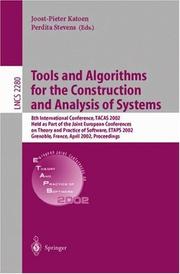
ISSN: 03029743 ISBN: 3540434194 3540460020 9783540434191 Year: 2002 Volume: 2280 Publisher: New York, NY ; Berlin : Springer-Verlag,
Abstract | Keywords | Export | Availability | Bookmark
 Loading...
Loading...Choose an application
- Reference Manager
- EndNote
- RefWorks (Direct export to RefWorks)
ETAPS 2002 was the ?fth instance of the European Joint Conferences on Theory and Practice of Software. ETAPS is an annual federated conference that was established in 1998by combining a number of existing and new conferences. This year it comprised 5 conferences (FOSSACS, FASE, ESOP, CC, TACAS), 13 satellite workshops (ACL2, AGT, CMCS, COCV, DCC, INT, LDTA, SC, SFEDL, SLAP, SPIN, TPTS, and VISS), 8invited lectures (not including those speci?c to the satellite events), and several tutorials. The events that comprise ETAPS address various aspects of the system - velopment process, including speci?cation, design, implementation, analysis, and improvement. The languages, methodologies, and tools which support these - tivities are all well within its scope. Di?erent blends of theory and practice are represented, with an inclination towards theory with a practical motivation on one hand and soundly-based practice on the other. Many of the issues involved in software design apply to systems in general, including hardware systems, and the emphasis on software is not intended to be exclusive.
System design --- Computer software --- Systèmes, Conception de --- Logiciels --- Congresses. --- Development --- Congrès --- Développement --- Computer Science --- Engineering & Applied Sciences --- Systèmes, Conception de --- Congrès --- Développement --- Computer science. --- Computer communication systems. --- Software engineering. --- Computers. --- Algorithms. --- Computer logic. --- Computer Science. --- Theory of Computation. --- Logics and Meanings of Programs. --- Software Engineering. --- Computer Communication Networks. --- Algorithm Analysis and Problem Complexity. --- Information theory. --- Logic design. --- Computer software. --- Software, Computer --- Computer systems --- Computer software engineering --- Engineering --- Design, Logic --- Design of logic systems --- Digital electronics --- Electronic circuit design --- Logic circuits --- Machine theory --- Switching theory --- Communication theory --- Communication --- Cybernetics --- Algorism --- Algebra --- Arithmetic --- Communication systems, Computer --- Computer communication systems --- Data networks, Computer --- ECNs (Electronic communication networks) --- Electronic communication networks --- Networks, Computer --- Teleprocessing networks --- Data transmission systems --- Digital communications --- Electronic systems --- Information networks --- Telecommunication --- Cyberinfrastructure --- Electronic data processing --- Network computers --- Computer science logic --- Logic, Symbolic and mathematical --- Automatic computers --- Automatic data processors --- Computer hardware --- Computing machines (Computers) --- Electronic brains --- Electronic calculating-machines --- Electronic computers --- Hardware, Computer --- Calculators --- Cyberspace --- Foundations --- Distributed processing --- System design - Congresses --- Computer software - Development - Congresses
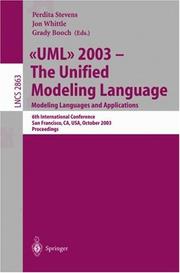
ISBN: 3540202439 3540452214 Year: 2003 Publisher: Berlin, Heidelberg : Springer Berlin Heidelberg : Imprint: Springer,
Abstract | Keywords | Export | Availability | Bookmark
 Loading...
Loading...Choose an application
- Reference Manager
- EndNote
- RefWorks (Direct export to RefWorks)
The past year has been an eventful one for those interested in software modeling. The first major revision of the Unified Modeling Language, UML2.0, is in the process of adoption by the Object Management Group (OMG), and it makes many long-desired additions and improvements to UML. At the same time, it expands what was already a large language. A challenge for both practitioners and researchers is to help smooth the adoption of this new language. Increasingly, attention is being paid to the use of specialized languages, often profiles of UML, appropriate for different purposes; this is one way to make UML less overwhelming. Accordingly, the focus of the UML conference is gradually expanding from UML to software modeling in general. Simultaneously, model-driven development is being pursued as a way of increasing the benefits from modeling throughout the software development process. Gradually, it is developing from a set of slogans into a reality. Many of the papers in this volume are concerned, directly or indirectly, with how to make modeling, rather than coding, the heart of software development, and how to realize the resulting benefits of higher-level thinking. Much work remains to be done.
Computer software --- -UML (Computer science) --- 681.3*D2 --- Unified Modeling Language (Computer science) --- Modeling languages (Computer science) --- Object-oriented methods (Computer science) --- 681.3*D2 Software engineering: protection mechanisms standards--See also {681.3*K63} {681.3*K51} --- Software engineering: protection mechanisms standards--See also {681.3*K63} {681.3*K51} --- Software, Computer --- Computer systems --- Development --- UML (Computer science) --- 681.3*D2 Software engineering: protection mechanisms; standards--See also {681.3*K63}; {681.3*K51} --- Software engineering: protection mechanisms; standards--See also {681.3*K63}; {681.3*K51} --- Model-integrated computing --- Programming software --- Computer science. --- Computer programming. --- Software engineering. --- Programming languages (Electronic computers). --- Computer simulation. --- Management information systems. --- Computer Science. --- Programming Techniques. --- Software Engineering. --- Programming Languages, Compilers, Interpreters. --- Simulation and Modeling. --- Management of Computing and Information Systems. --- Computer-based information systems --- EIS (Information systems) --- Executive information systems --- MIS (Information systems) --- Sociotechnical systems --- Information resources management --- Management --- Computer modeling --- Computer models --- Modeling, Computer --- Models, Computer --- Simulation, Computer --- Electromechanical analogies --- Mathematical models --- Simulation methods --- Computer languages --- Computer program languages --- Computer programming languages --- Machine language --- Electronic data processing --- Languages, Artificial --- Computer software engineering --- Engineering --- Computers --- Electronic computer programming --- Electronic digital computers --- Programming (Electronic computers) --- Coding theory --- Informatics --- Science --- Communication systems --- Programming --- Information Systems. --- Information Systems management --- Corporations --- Information resource management --- Information systems management --- IRM (Information resources management) --- Management information systems --- Programming languages (Electronic computers)
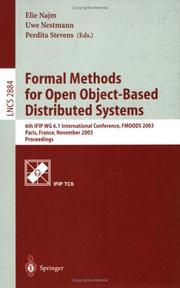
ISBN: 3540399585 3540204911 Year: 2003 Publisher: Berlin, Heidelberg : Springer Berlin Heidelberg : Imprint: Springer,
Abstract | Keywords | Export | Availability | Bookmark
 Loading...
Loading...Choose an application
- Reference Manager
- EndNote
- RefWorks (Direct export to RefWorks)
This volume contains the proceedings of FMOODS 2003, the 6th IFIP WG 6. 1 International Conference on Formal Methods for Open Object-Based Distributed Systems. The conference was held in Paris, France on November 19–21, 2003. The event was the sixth meeting of this conference series, which is held roughly every year and a half, the earlier events having been held in Paris, Canterbury, Florence, Stanford, and Twente. ThegoaloftheFMOODSseriesofconferencesistobringtogetherresearchers whose work encompasses three important and related ?elds: – formal methods; – distributed systems; – object-based technology. Such a convergence is representative of recent advances in the ?eld of distributed systems,andprovideslinksbetweenseveralscienti?candtechnologicalcommu- ties, as represented by the conferences FORTE/PSTV, CONCUR, and ECOOP. The objective of FMOODS is to provide an integrated forum for the p- sentation of research in the above-mentioned ?elds, and the exchange of ideas and experiences in the topics concerned with the formal methods support for open object-based distributed systems. For the call for papers, aspects of int- est of the considered systems included, but were not limited to: formal models; formal techniques for speci?cation, design or analysis; component-based design; veri?cation, testing and validation; semantics of programming, coordination, or modeling languages; type systems for programming, coordination or modelling languages; behavioral typing; multiple viewpoint modelling and consistency - tween di?erent models; transformations of models; integration of quality of s- vice requirements into formal models; formal models for security; and appli- tions and experience, carefully described.
Electronic data processing --- Object-oriented programming (Computer science) --- Computer Science --- Engineering & Applied Sciences --- Distributed processing --- Computer science. --- Computer communication systems. --- Computer programming. --- Software engineering. --- Programming languages (Electronic computers). --- Operating systems (Computers). --- Computer logic. --- Computer Science. --- Programming Techniques. --- Computer Communication Networks. --- Software Engineering. --- Programming Languages, Compilers, Interpreters. --- Operating Systems. --- Logics and Meanings of Programs. --- Logic design. --- Design, Logic --- Design of logic systems --- Digital electronics --- Electronic circuit design --- Logic circuits --- Machine theory --- Switching theory --- Computer operating systems --- Computers --- Disk operating systems --- Systems software --- Computer software engineering --- Engineering --- Informatics --- Science --- Operating systems --- Computer science logic --- Logic, Symbolic and mathematical --- Computer languages --- Computer program languages --- Computer programming languages --- Machine language --- Languages, Artificial --- Communication systems, Computer --- Computer communication systems --- Data networks, Computer --- ECNs (Electronic communication networks) --- Electronic communication networks --- Networks, Computer --- Teleprocessing networks --- Data transmission systems --- Digital communications --- Electronic systems --- Information networks --- Telecommunication --- Cyberinfrastructure --- Network computers --- Electronic computer programming --- Electronic digital computers --- Programming (Electronic computers) --- Coding theory --- Programming --- Computer networks. --- Programming languages (Electronic computers) --- Operating systems (Computers)
| Listing 1 - 8 of 8 |
Sort by
|

 Search
Search Feedback
Feedback About UniCat
About UniCat  Help
Help News
News